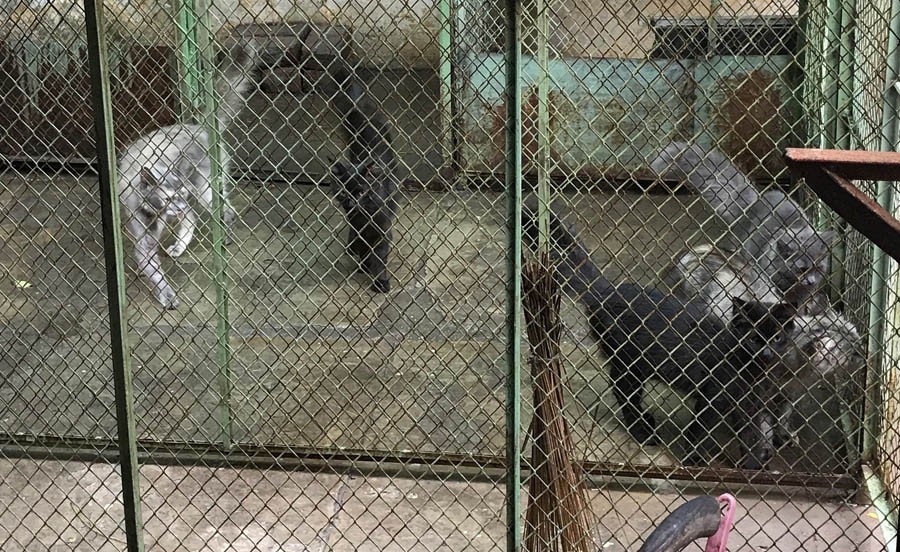
Sounds of birds twittering, the gentle purr of cats, and the occasional bark unexpectedly ring out, as you approach Prof Shaista Sirajuddin’s olden bungalow which is home to varied pets

At a certain point along Sarwar Road in Lahore’s Cantonment area, the sounds of birds twittering, the gentle purr of cats, and the occasional bark unexpectedly ring out in what is an urban setting. They emanate from a single old house, which at first glance may not seem very different from any other. But hidden away inside is a different world entirely, a miniature habitat for dozens of animals who have nowhere else to go.
As you enter the gates, parrots and exotic birds greet you from their perches and statues of animals stand as an unusual form of decoration, alien to most gardens and porches in our city. The owner of the place, Shaista Sirajuddin, is Professor and Chairperson, Department of English Language & Literature, University of the Punjab, who tends to her grandchildren, writes occasionally for a journal, and manages a particularly large household. The household consists not just of humans but a multitude of cats, dogs, and birds are among the occupants treated as family members or her "bachay" by Shaista.
Since she was a little girl, Sirajuddin has enjoyed a passionate love for animals, especially the stray, abandoned, neglected dogs and cats that most of us chase away from our homes. She is deeply saddened by the condition of animals in the country, especially strays, and rescues those she can from the streets or from markets where they are held in cramped, filthy cages. Throughout her life, she has cared for hundreds of these creatures, staying by their side from the time they must be bottle-fed to when they take their last breaths.
The house and grounds, in which a large number of kennels, rooms and aviaries have been built, were inherited from her parents. So too was her love of animals. Shaista’s father, the late Professor Sirajuddin, and also a principal of Government College Lahore, rescued many dogs and cats while she was growing up.
"I am lucky my parents left me this large house," she says, in an exclusive meeting with TNS, "This means enough space for the animals.
"I see my home as a haven for these animals, especially since there are no functional animal centres in the city."
She says that in some cases the animals "adopted" her instead of the other way around, with runaways showing up at her doorstep. "Animals have an instinct and are sometimes drawn to places where they know they’ll have a friendly home."
In other instances, people have dropped off unwanted puppies, knowing she will not turn them away.
Sirajuddin says she struggles to find the resources to care for and feed her large household and its four-legged inhabitants. No organisation has helped her; the only assistance she has received is from a vet, Dr Ahmed Raza, who she says has cared for the many animals she has brought in, from flea-infested dogs to injured birds to rabbits. "I work 40 per cent because I love my subject; and 60 per cent to support my animals."
She reveals that she only employs staff who are fond of animals. Even then, however, she trusts nobody but herself to feed and medicate them. "I haven’t left Lahore since my mother passed away, because now there is no one else to take care of the animals properly."
On top of the lack of support, there are people who make active efforts to prevent her from providing badly-needed aid to animals. "Even though this is an upper-middle class area, I find that by and large, apart from very few who keep pets, people are not well-disposed towards animals. They complain about all sorts of things. Some say the angels will not come because of the dogs, dragging religion into everything." Others, she says, voice their concern over the noise.
Commenting on the popular perception that those who love or care for animals do not have the same sentiments for human beings, she says: "They’re not entitled to these views. Having been a teacher all my life, of course, I care about and associate with people, too."
She says she has grown so weary of explaining her stance that she no longer talks about the subject.
She once rescued a dog riddled with mange and hardly able to walk and medicating it patiently for months until it was clear of the unsightly skin disease. What especially shocks her is the mercilessness inherent in the manner stray dogs are killed on the streets. "They are not only shot, but also given poison, which is absolutely terrible. I have absolutely no regard for human beings who cannot find it in themselves to be humane."
She recommends a programme of sterilising stray animals to prevent further growth in their population, and further problems for a city where she says the spirit of "live and let live" has died. She also stresses on the need for good animal shelters to be established, "It is my dream that before I die, I open an animal shelter, which I will name The Sirajuddin Shelter, after my father."
Her own house is a happy one for animals of every kind. The dogs and cats have found a safe home, and the birds twitter happily in the aviary created for them. Even the statues of lions on her porch wear cheerful expressions. "These are happy lions, not like those of Nawaz Sharif!" she says, with a laugh.